Projects involve many moving parts, and teams rarely complete them in isolation. Departments, locations, and even countries must work together to move projects forward. To manage these projects effectively across multiple teams, organizations need to consider engineering management platform software.
An engineering management platform software acts as a digital hub that helps organizations plan, organize, monitor, and improve engineering projects, teams, and processes. It gives engineers, project managers, and stakeholders a central place to collaborate, track progress, manage resources, and ensure every effort supports business goals. These software now connect schedules, budgets, and team capacity in one system, transforming administrative tasks into clear, actionable data.
Here are the top 15 engineering management platform software used by engineering teams across various disciplines (software, civil, mechanical, etc.).
Top 15 Engineering Management Platform Software
1. Bluebeam Revu
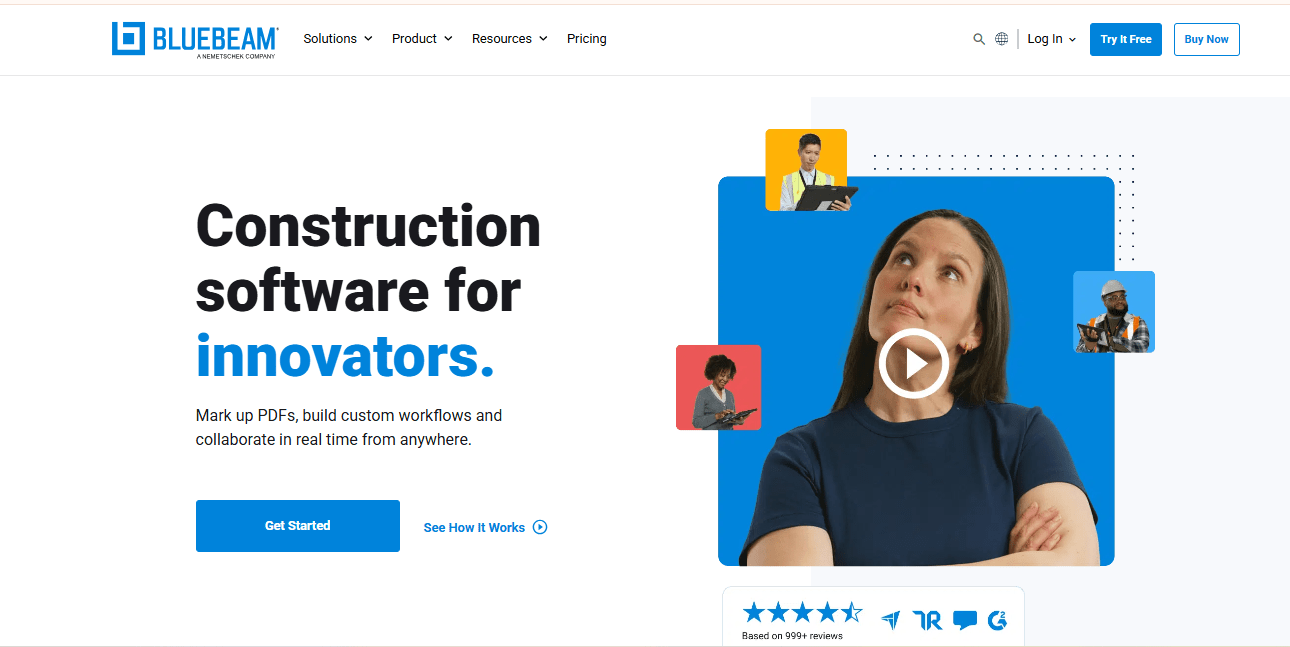
Bluebeam Revu is construction project management software that helps architects, engineers, and contractors create, edit, and share PDF documents. The tool supports both office and field use. It is well-known for its PDF markup, creation, and management features, which work with Microsoft Office and CAD programs. In addition, users can edit 2D and 3D PDFs, and they can verify measurements such as length, area, perimeter, radius, and volume. Bluebeam Cloud also gives access on any device without installation. As a result, teams can open tool sets and Studio files from anywhere and keep projects moving without interruption.
Features
- Markup and annotation tools
- Measurement and takeoff tools
- Document management and organization
- Automatic quantity linking and report generation
- Advanced PDF editing and exporting.
Pros
- Provides accurate measurement and estimation
- Improves collaboration across project teams
- Supports flexible workflows for different project needs.
Cons
- The cost is high for some users
- The interface is not intuitive; icons can be confusing if users do not know the terms.
Pricing
- Basic: $260 per user, billed annually
- Standard: $330 per user, billed annually
- Complete: $440 per user, billed annually.
Who Is It For?
- Construction management professionals
- Architects
- Engineers
- Specialist contractors
- Quantity surveyors (QS)
2. Project Insight
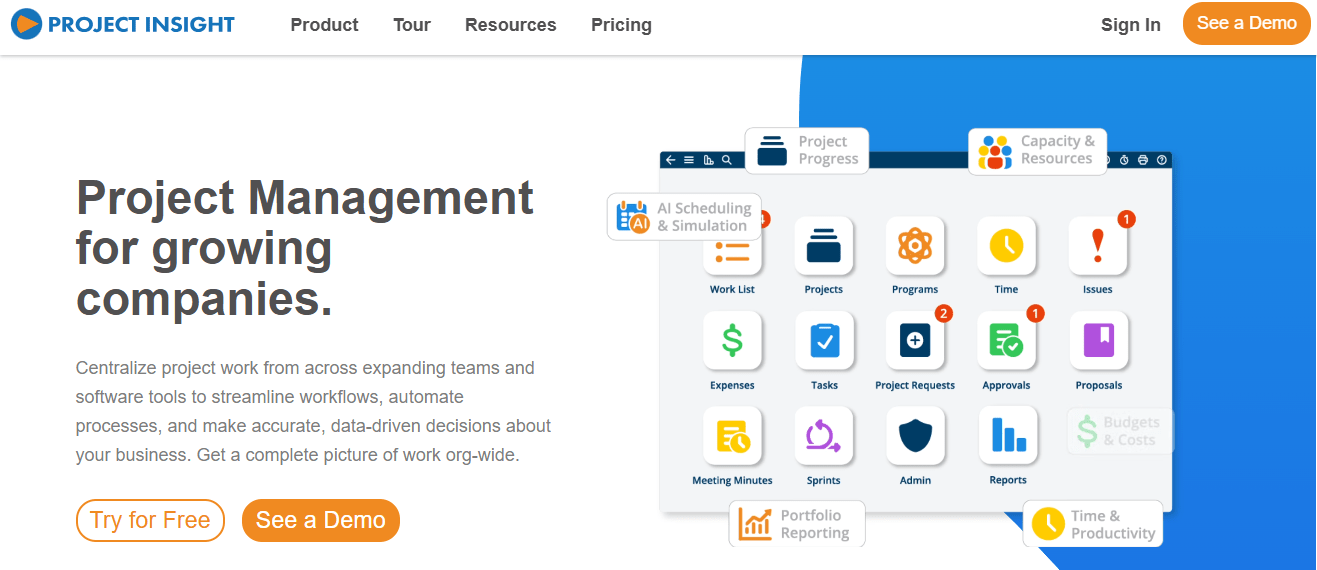
Project Insight is an enterprise-grade project and portfolio management platform that centralizes all organizational work in one hub. Teams use its task management tools to assign responsibilities, set deadlines, and manage dependencies. This approach provides visibility into workflows and helps identify potential bottlenecks early.
The platform also supports resource management by allocating and monitoring personnel, equipment, and budgets. This control helps project managers avoid overbooking, reduce underutilization, and maintain budgets and schedules for successful project delivery.
Features
- Task Management: Tracks and organizes tasks, helping teams set priorities and meet deadlines.
- Time Tracking: Monitors time spent on activities to support accurate billing and productivity reviews.
- Resource Management: Displays team workloads to ensure effective allocation of people and resources.
- Reporting and Analytics: Produces detailed reports that provide insight into project progress and performance.
- Collaboration Tools: Facilitates communication with shared workspaces, comments, and discussion threads.
Pros
- Custom Dashboards and Reporting: Users create dashboards and reports that give precise insights and support real-time project adjustments.
- Effective Resource Allocation: Managers assign personnel and materials efficiently, preventing overuse or idle capacity.
- Accurate Time Tracking: Built-in time logging improves billing accuracy and offers clear visibility into costs and schedules.
- Collaboration Support: Tools like comments and notifications enhance communication and reduce misunderstandings.
Cons
- New users may find the platform complex.
- Integration with other apps is not seamless.
Pricing
- Free
- Pro: $9
- Business: $19
- Enterprise: Custom pricing
Who Is It For?
Construction companies can use Project Insight to oversee large, multi-contractor projects.
3. Accelo
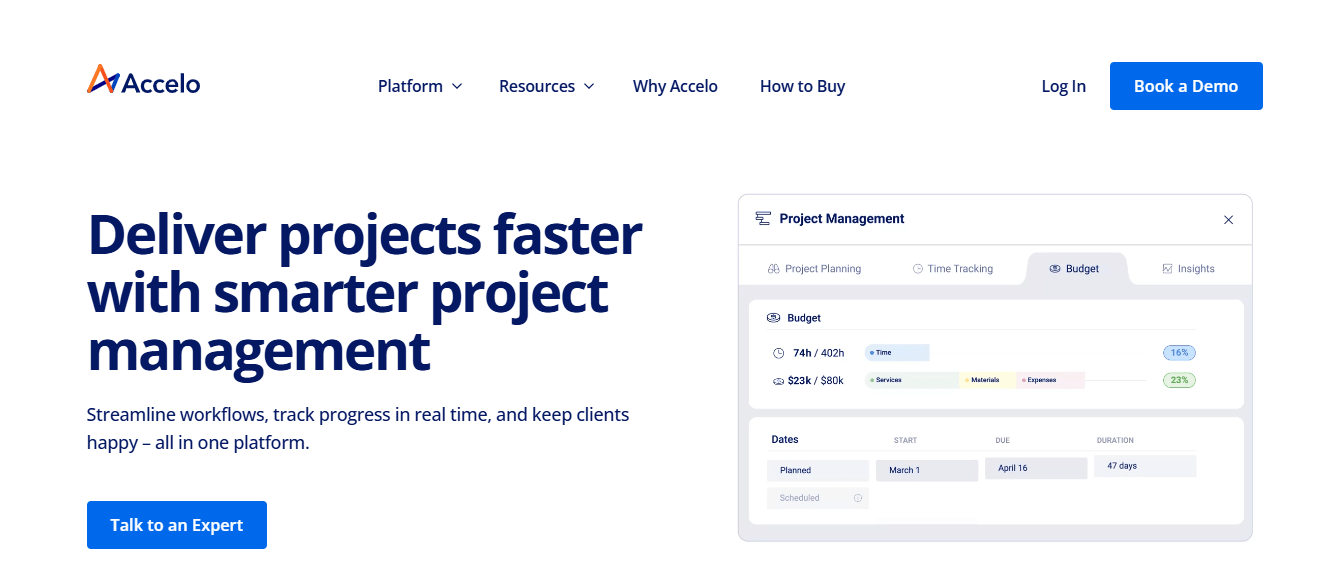
Accelo helps engineering managers improve operational efficiency by giving them control over every phase of a project from planning to billing. Engineering businesses favor the platform because it allows detailed oversight of tasks and deadlines. Its client-focused design and automated workflows reduce administrative effort. As an end-to-end, cloud-based system, Accelo covers the entire client work cycle, from prospecting to payment. This includes managing sales, projects, tickets, retainers, timesheets, resourcing, and more.
Features
- Automatically synced email feed that records all client communication
- Project budgets with custom rates by staff member or work object
- Detailed and automated time tracking
- White-labeled client portal for professional branding
Pros
- Automatic time tracking ensures accurate billing without added effort
- Client portal improves communication and transparency with clients
- Project tracking makes it easier for teams to manage ongoing work
Cons
- Mobile app offers fewer features than the desktop version, limiting management on the go
- Reporting features lack flexibility for highly specific needs
- User interface can feel cluttered, creating a learning curve for new users
Pricing
- Book a demo to explore Accelo’s pricing options.
4. Tempo
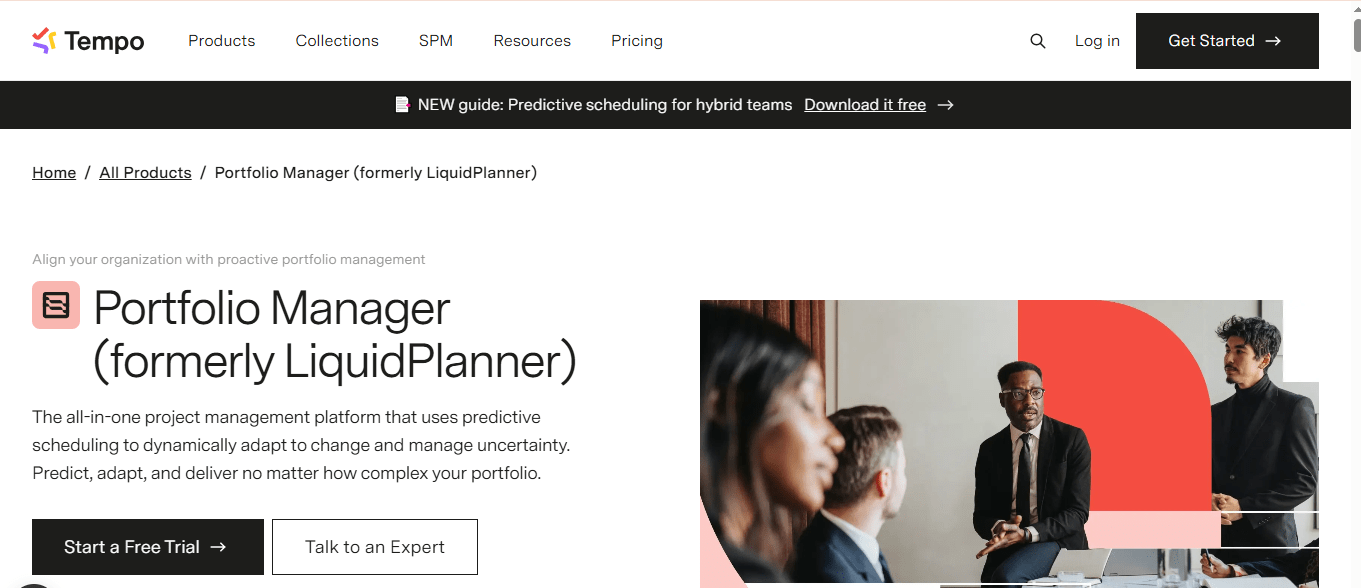
Tempo Portfolio Manager (formerly LiquidPlanner) is a project management software that supports planning, tracking, and managing projects. It works best for tech-savvy teams in industries such as IT and engineering, where projects are complex and constantly changing. The software adapts to shifting priorities, keeps teams aligned, and ensures projects meet organizational goals.
Tempo Portfolio Manager uses advanced simulations to predict realistic project finish dates, giving teams confidence in their planning. It distributes workloads automatically across multiple projects to prevent resource overload. Its real-time scenario modeling allows teams to update plans instantly and prioritize effectively as conditions change.
Features
- Time tracking with attached rates
- Granular task assignments
- Priority-based project planning
- Open API for integrations
Pros
- Predictive scheduling provides more accurate planning
- Customizable for specific engineering needs
- Estimate ranges available for projects
- Handles parallel projects and exceptions effectively
Cons
Complex system may require a long training period
Pricing
- Essentials: $15.00 per user, per month
- Professional: $28.00 per user, per month
- Ultimate: $42.00 per user, per month
Who Is It For?
Project managers, engineering teams, and IT departments.
5. Jira

Jira Software is a cloud-based project management solution that helps agile teams collaborate, plan, and track projects from start to finish. It supports software development teams by aligning work with project goals and timelines. Jira has become the industry standard for Scrum and Kanban boards, sprint planning, backlog management, and DevOps tool integration. It is best suited for agile software engineering and bug tracking.
Features
- Adapts to agile teams
- Drag-and-drop automation setup
- Interactive roadmaps
- Centralized task management
- Sleek Scrum and Kanban boards
Pros
- Supports Scrum and Kanban workflows, boosting team productivity
- Allows quick setup of automation rules, helping teams work faster
- Offers custom filters for efficient task management
Cons
- Crowded interface in Scrum projects can make navigation difficult
- Lacks resource management capabilities, limiting planning options.
Pricing
- Free
- Standard – $7.53/user/month
- Premium – $13.53/user/month
- Enterprise – Custom pricing.
Who Is It For
- Large engineering teams
- Complex projects that require detailed tracking.
6. Jellyfish
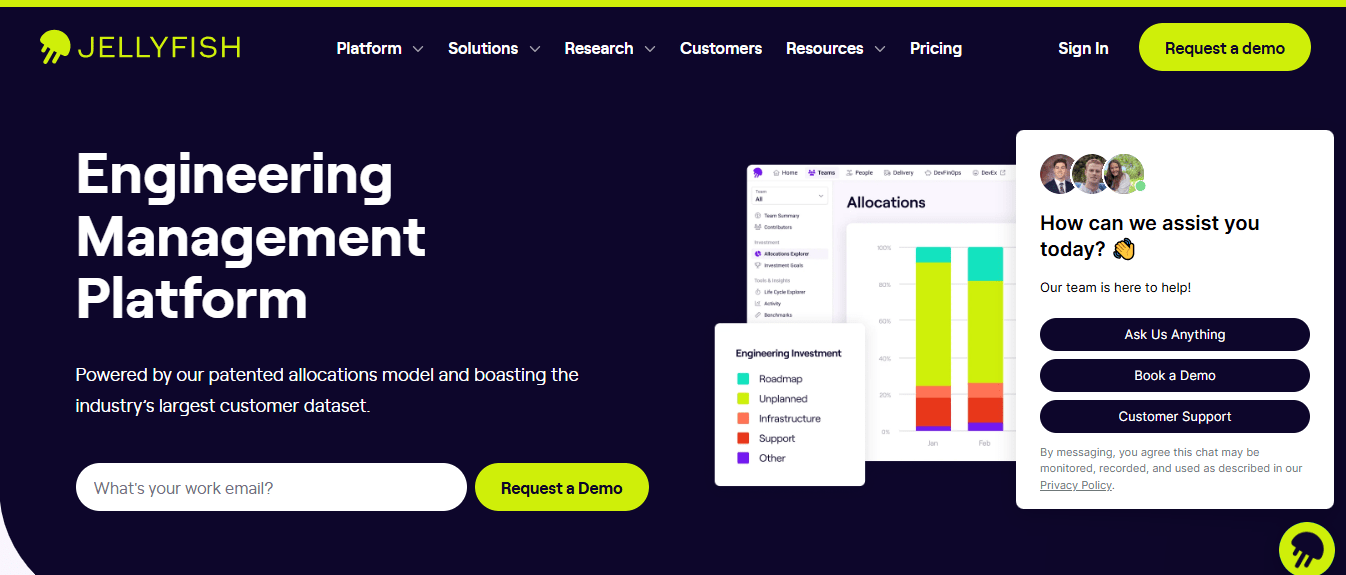
Jellyfish is an engineering management platform that pioneers the use of contextual business data for decision-making. The platform provides actionable insights and visibility by analyzing engineering signals alongside business data. It automates data collection, delivers performance metrics, and applies a Resource Allocation model to help leaders track engineering work and set priorities with evidence-based insights.
Features
- Analyzes contextual business data to support decision-making
- Automates data collection for engineering performance metrics
- Provides evidence-based insights for priority setting
- Uses a Resource Allocation model to track engineering work
- Integrates with multiple third-party business tools
Pros
- Automatically analyzes engineering signals
- Helps leaders maintain strategic alignment
- Offers integration with several third-party tools
- Provides responsive customer service.
Cons
- Lacks API access
- Limits report customization options.
Pricing
Pricing available upon request.
Who Is It For
Jellyfish supports industries and sectors where engineering plays a central role, including:
- Technology
- Manufacturing
- E-commerce
- Software development.
7. BQE Core
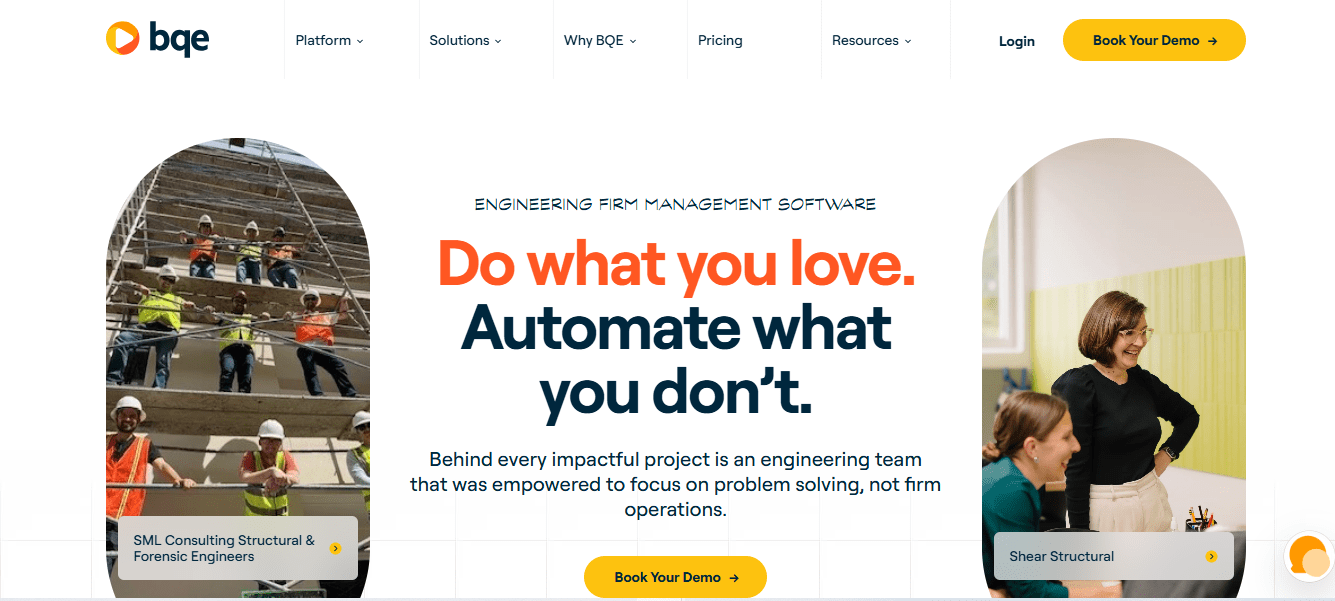
BQE Core is a practice management solution that serves architects, engineers, and other professional services firms. The platform focuses on delivering actionable insights into financial and operational performance. With its reporting tools and back-office functions, firms can monitor project performance, track resources, and make better decisions about budgeting and profitability.
Features
- Tracks expenses and manages invoicing
- Provides project accounting tools
- Offers in-depth financial tracking
- Measures utilization and core project metrics.
Pros
- Creates detailed insights with customizable dashboards
- Includes strong time-tracking tools
- Supports accurate profitability forecasting
- Receives positive feedback for customer support.
Cons
- Responds slowly when switching between screens
- Involves a difficult setup process.
Pricing
You need to request a quote.
Who Is It For
- Architectural firms
- Engineering firms
- Consultants
- Professional services companies.
8. Celoxis
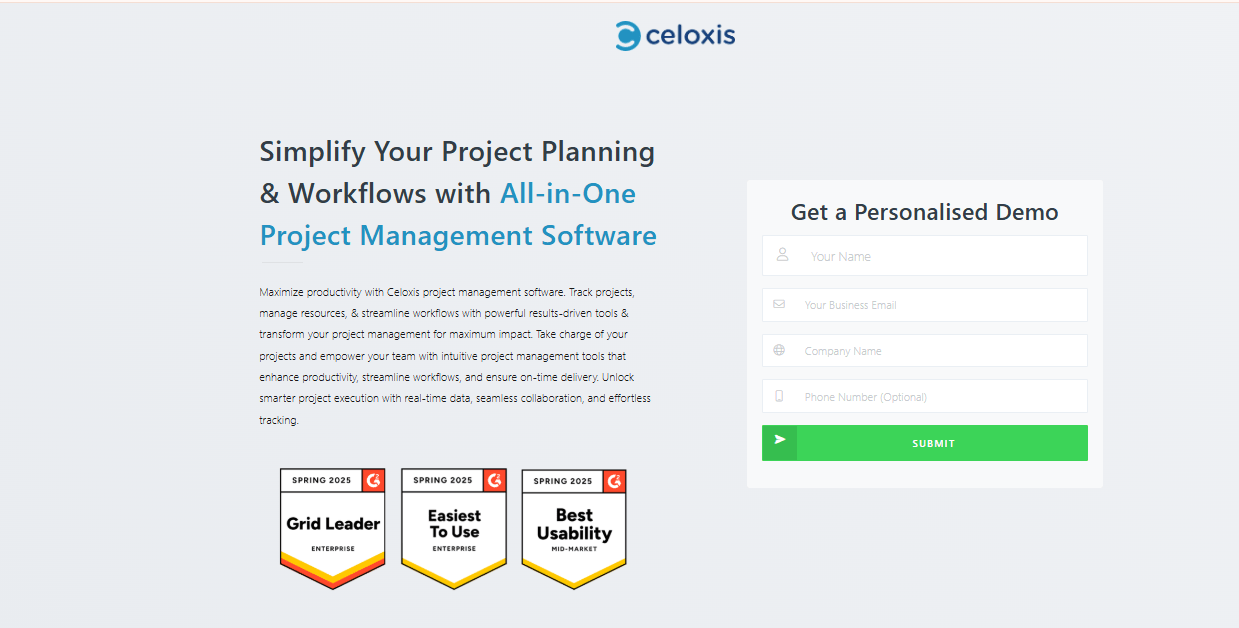
Celoxis is a project management software that uses AI and robust tools to simplify project delivery and improve workflows. It provides Gantt charts, real-time dashboards, and advanced resource management to reduce friction and improve visibility. It gives teams a unified view that enhances collaboration and supports informed decision-making by offering a single source of truth and centralized project data. Its unique KPIs and user-friendly interface help teams manage projects with greater accuracy and efficiency.
Features
- Integrated timesheet and expense tracking to log billable and non-billable hours for accurate invoicing and budget control.
- Scenario analysis tool that allows project managers to test multiple “what-if” scenarios and predict outcomes.
- Client portals that enable stakeholders to track progress, provide feedback, and share files.
Pros
- Provides a portfolio-level view with dashboards.
- Offers high customization and flexibility for growing organizations.
- Includes advanced reporting and analytics, with AI-powered forecasting.
Cons
- Does not offer a mobile app.
- May not fit small teams or organizations with fewer than five employees.
Pricing
Available on request.
Who Is It For?
- Software development teams.
- Organizations managing complex projects.
9. Deltek Vantagepoint
Deltek is a project management software platform that supports the entire lifecycle of project-based work—from planning and execution to financials and client management. It serves firms that manage large contracts, complex budgets, and client-heavy operations. The platform covers every stage of project delivery, from capturing leads to executing tasks and issuing invoices. Users gain immediate access to critical data through dynamic visualization, customizable dashboards, and robust reporting tools.
Features
- Plan and track every project stage with tools that keep timelines and deliverables on schedule.
- Allocate staff and resources effectively to prevent overbooking and maintain proper workload distribution.
- Manage budgets, expenses, and invoices while generating accurate financial reports.
- Organize client details with built-in customer relationship management tools.
Pros
- Provides detailed project views and in-depth financial analysis.
- Handles complex and diverse billing requirements.
- Supports transactions in multiple currencies.
Cons
- Some users report difficulty navigating the interface.
- The auto-save function requires extra clicks to complete tasks.
- The expense platform layout lacks efficiency.
Pricing
Contact Deltek for pricing details.
Who Is It For
- Architecture firms
- Engineering companies
- Consulting agencies
- Marketing teams.
10. OpenProject
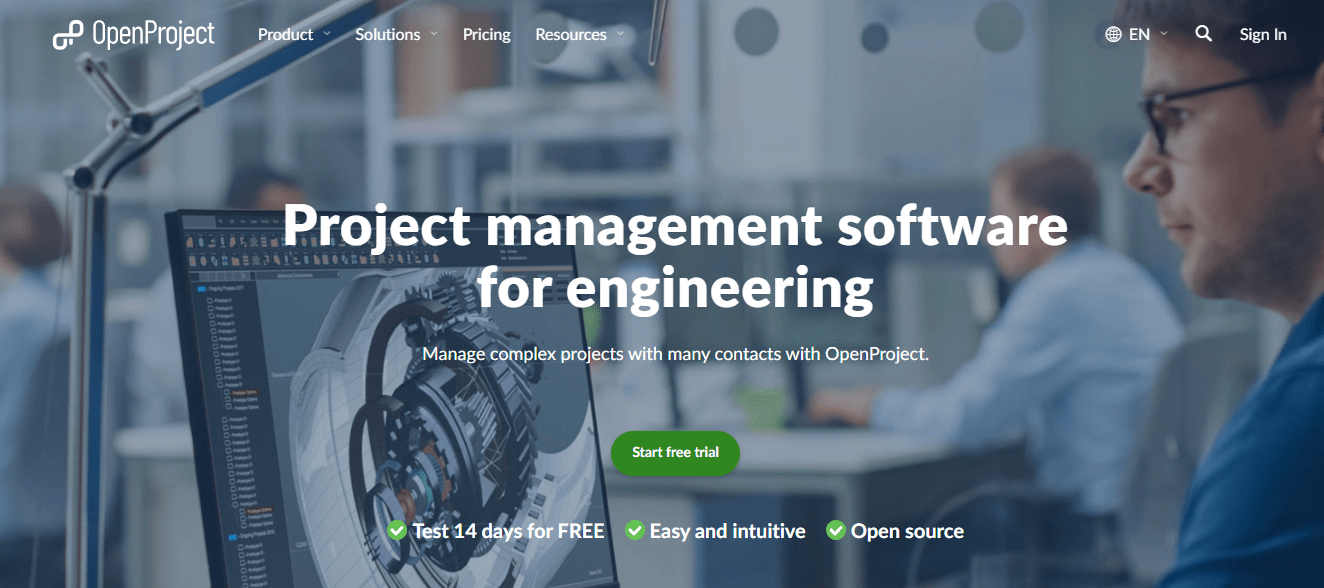
OpenProject manages every phase of a project from planning to delivery using both structured and Agile methodologies. You can run projects with fixed timelines or shifting priorities, and the platform adapts to your preferred style of work. As an open-source project management tool, OpenProject serves security-conscious engineering firms that must maintain strict compliance and protect sensitive workflows. The platform secures confidential client data and proprietary designs with HTTPS encryption, two-factor authentication, salted bcrypt password protection, and session runtime controls.
Features
- Create interactive Gantt charts to build project plans, set deadlines, and visualize task dependencies.
- Plan sprints, manage backlogs, and run Agile boards to keep teams aligned and productive.
- Track tasks and issues with built-in task management tools that support assignments and progress updates.
Pros
- Easy to set up and start using
- Open-source, ensuring transparency
- Offers cost reporting and budgeting features.
Cons
- Basic plans come with limited support
- Integrations are fewer compared to some competitors.
Pricing
Basic Plan: $7.25 per user per month.
Who Is It For?
Engineering firms that prioritize security and compliance.
11. Waydev
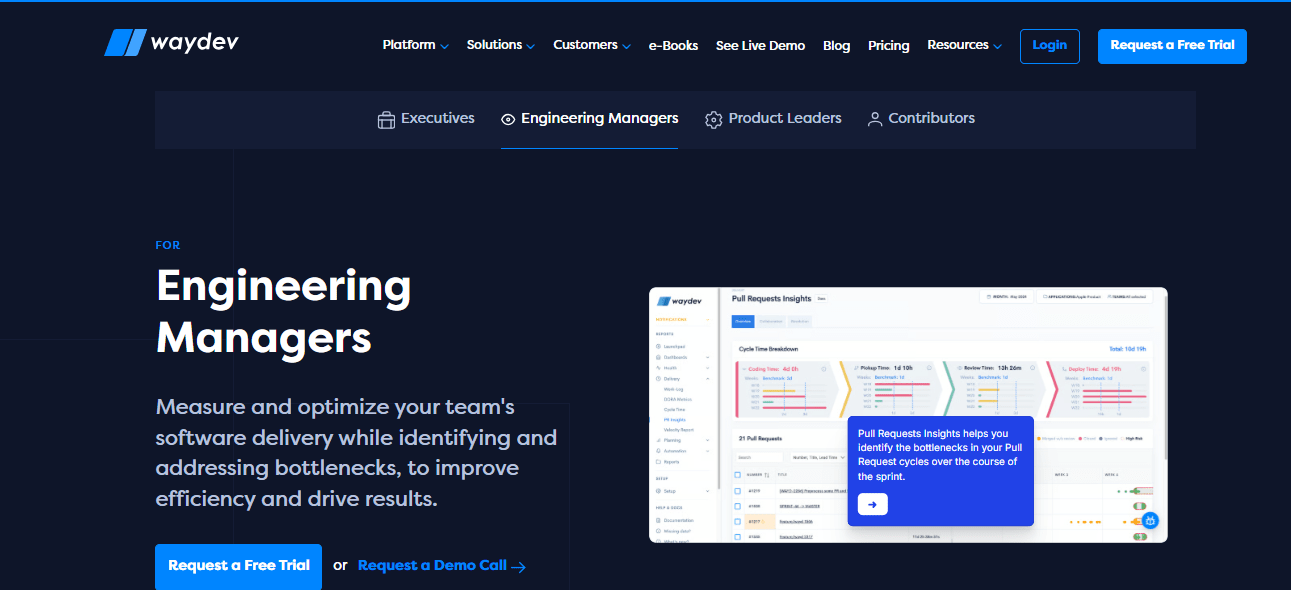
Waydev is a software engineering intelligence tool that analyzes activity across code, pull requests, and tickets. It eliminates manual input by pulling data directly from your existing tools. Engineering leaders use it to monitor output and identify constraints, while executives use it to visualize productivity levels. The platform highlights performance insights that increase the impact of engineering departments.
Features
- Provides a full view of DORA metrics to track delivery speed and frequency of value reaching users.
- Breaks down cycle times to identify delays and offer solutions for improvement.
- Tracks pull requests with detailed stats on review time, comments, and commit history to enhance code reviews.
- Allows you to build custom dashboards with key metrics to keep your team aligned with goals.
Pros
- Offers a strong dashboard with a useful timecard view showing commit timing for each contributor.
- Provides a simple, clean interface.
Cons
- Experiences occasional sync issues.
- Lacks more advanced, high-level reporting.
Pricing
- Pro: $29
- Premium: $54
- Enterprise: Custom quote
Who Is It For?
Waydev fits teams seeking software delivery intelligence. It gives visibility into engineering performance, developer productivity, and DORA metrics, enabling engineering leadership to make data-driven decisions.
12. Wrike
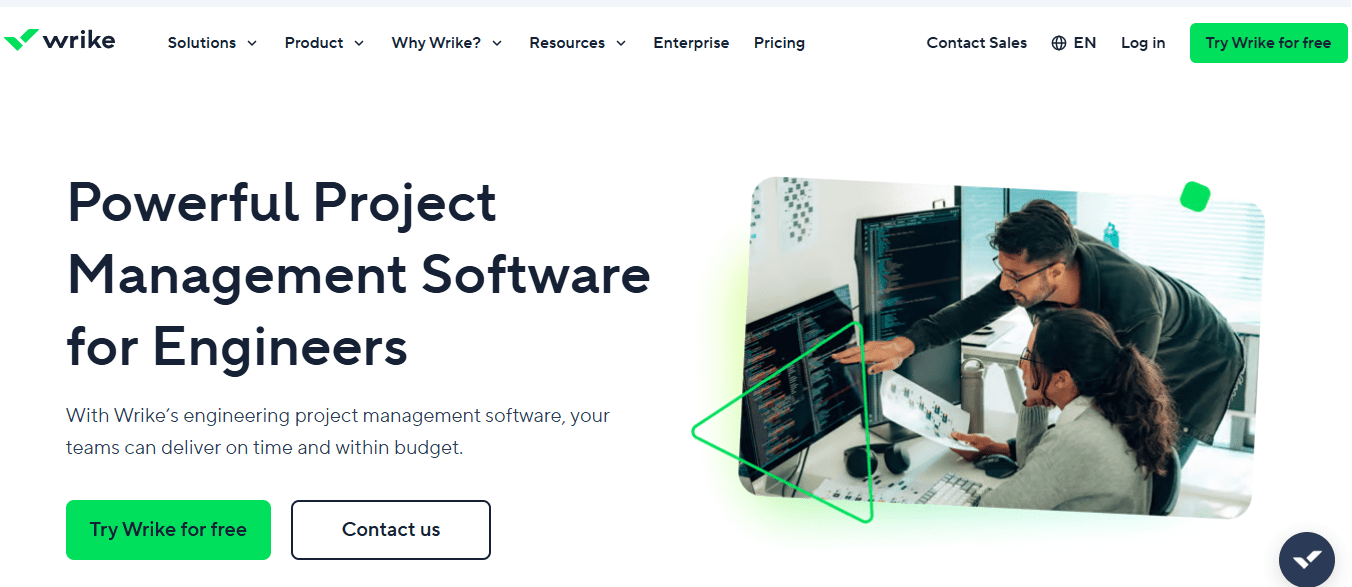
Wrike is an all-in-one project management software that serves both small teams and large enterprises. The cloud-based platform helps organizations organize work, manage timelines, and enhance collaboration. Project managers use Wrike to gain control over complex, multi-phase projects across departments without slowing their teams down. Its scalability makes it suitable for growing businesses with evolving project demands.
Features
- Show team workload with visual workload views and personal timesheets to prevent burnout and improve task tracking.
- Support communication through live updates, shared dashboards, and built-in document collaboration.
- Allow workflow customization to fit specific needs, from IT tickets to engineering change requests.
- Track time and budget at every project stage.
Pros
- Provides world-class onboarding with video walkthroughs.
- Offers right-click context menus that reduce steps and save time.
- Includes AI features in all plans at no extra cost.
Cons
- Charges extra for integrations regardless of the chosen plan.
- Restricts two-factor authentication (2FA) to the enterprise plan.
Pricing
- Free
- Pro: $10 per user/month
- Business: $25 per user/month
- Enterprise & Pinnacle: Contact sales for pricing
Who Is It For
Wrike fits businesses of all sizes and adapts as their needs evolve, making it ideal for teams managing both simple and highly complex projects.
13. Microsoft Project
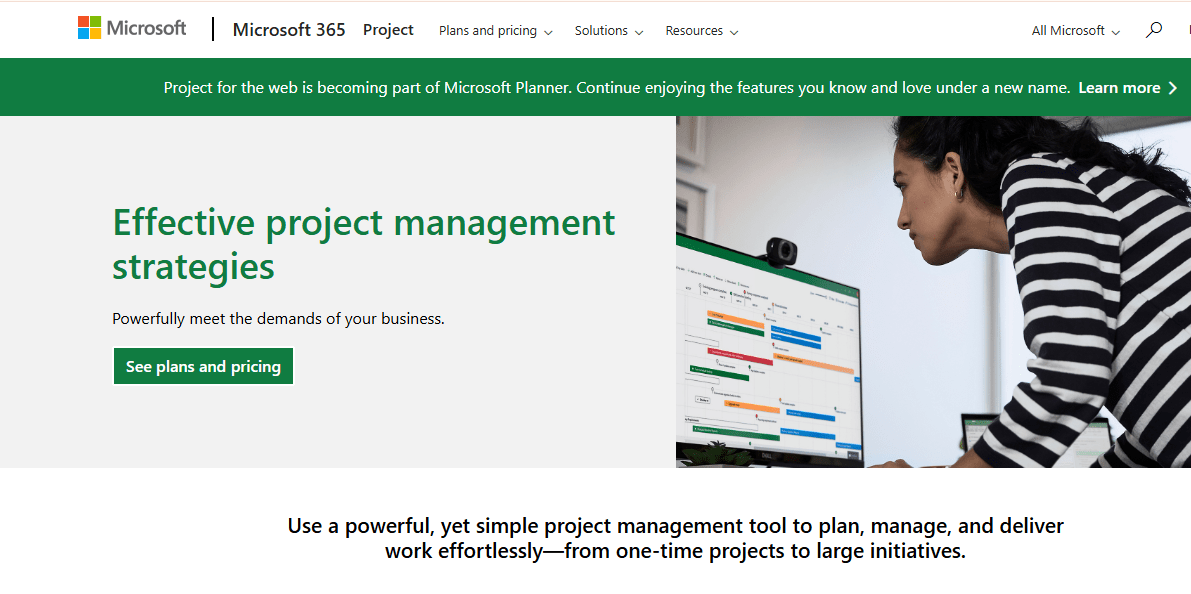
Microsoft Project supports engineering firms and other industries in managing multiple projects. It provides high-level reporting and portfolio forecasting to help firms make profitable decisions. The software’s portfolio optimization tools allow users to evaluate project proposals and select those that deliver the most value. With modeling features, AI-driven business intelligence, and advanced reporting, Microsoft Project helps you align projects with your available resources, workload, and budget.
Features
- Project management
- Resource management
- Portfolio management
- Project planning templates
- Waterfall templates
- Dynamic scheduling
- Business intelligence insights
- Automated workflows
Pros
- Built-in time tracking
- Supports multiple project management methodologies
- Extensive feature set
Cons
- No mobile app
- Base plan available only on the cloud
Pricing
- Planner Plan 1: $10.00 /user/month
- Project Plan 3: $30.00 /user/month
- Project Plan 5: $55.00 /user/month
Who Is It For
- Construction
- Engineering
- Marketing
- Product development and IT teams.
14. ProjectManager
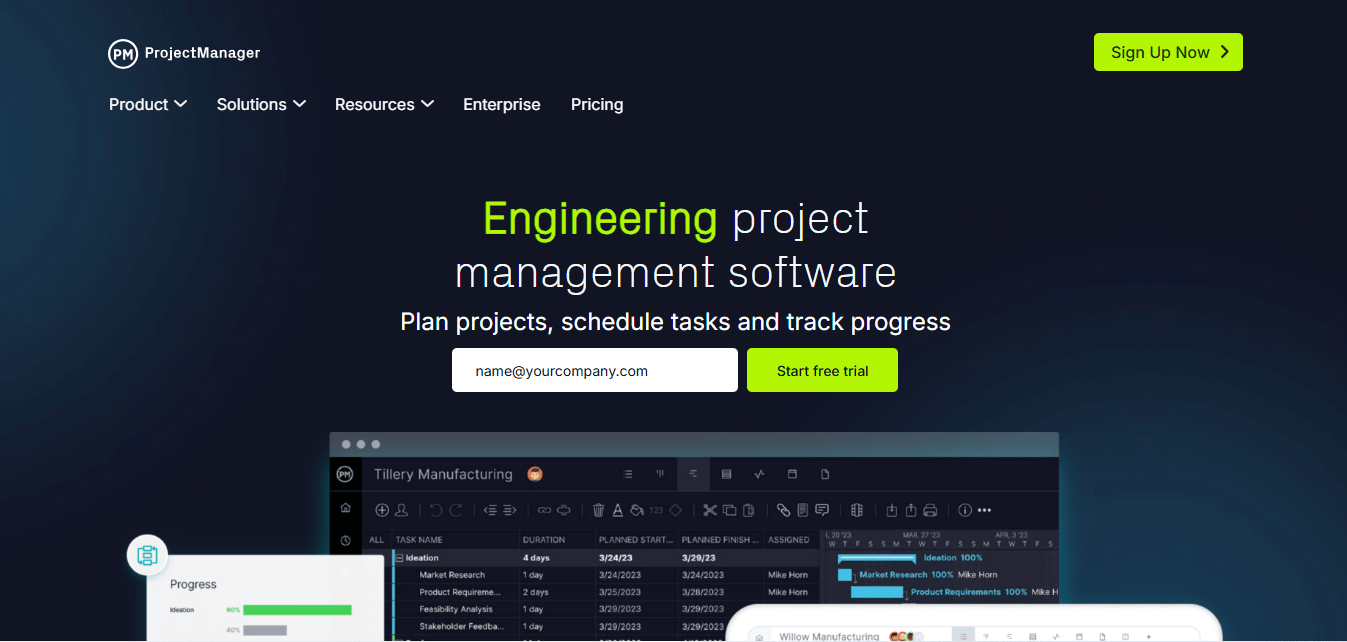
ProjectManager helps teams plan projects, build workflows, and manage resources in one platform. The software supports planning, forecasting, cost analysis, resource allocation, task management, and reporting. Its colorful interface makes navigation simple, while the visual dashboards highlight essential metrics such as workload, budget, task completion, schedules, and overall project health. The tool is especially effective for mid-size engineering firms but adaptable across industries.
Features
- Plan projects with waterfall modeling and Gantt forecasting.
- Give engineers prioritized task lists they can check off as they complete items.
- Provide executives with portfolio tools for high-level overviews, detailed reports, and long-term roadmaps.
- Enable team collaboration with comments, file sharing, and user tagging.
- Visualize progress through Gantt charts, dashboards, and Kanban boards.
Pros
- Strong reporting capabilities.
- Easy-to-read, real-time dashboards.
- Cloud-based access from anywhere.
Cons
- High cost for smaller firms.
- Base plan excludes integrations.
Pricing
- Teams – $14/user/month
- Business – $26/user/month
- Enterprise – Customized pricing
Who Is It For?
ProjectManager fits businesses of all sizes, from startups to large enterprises. It is especially useful in industries such as: manufacturing, construction and technology industries.
15. Monograph
Monograph serves as a hub for engineering project scheduling, budgeting, and resource planning. Its ultra-simple interface suits busy firms that want quick setup and minimal training. Employees record time and expenses directly in the system, while colorful Gantt charts display how their hours align with project timelines and budgets.
Features
- Project planning
- Project management
- Resource management
- Online time tracking
- Online invoicing
- Integration with QuickBooks Online
Pros
- Convenient percent-complete and progress billing
- Clear schedule and budget visualization
- Simple, user-friendly interface.
Cons
- No integrated accounting functions
- Limited feature set
Pricing
Contact Monograph for pricing details.
Who Is It For
Architecture, engineering, and construction (AEC) firms.
The right engineering management platform directly boosts your team’s productivity, improves project success rates, and increases job satisfaction. Investing in the right software delivers returns through higher efficiency, stronger project results, and more satisfied engineering teams. As the field evolves, keep track of new features and upcoming platforms that can meet your organization’s changing needs.

